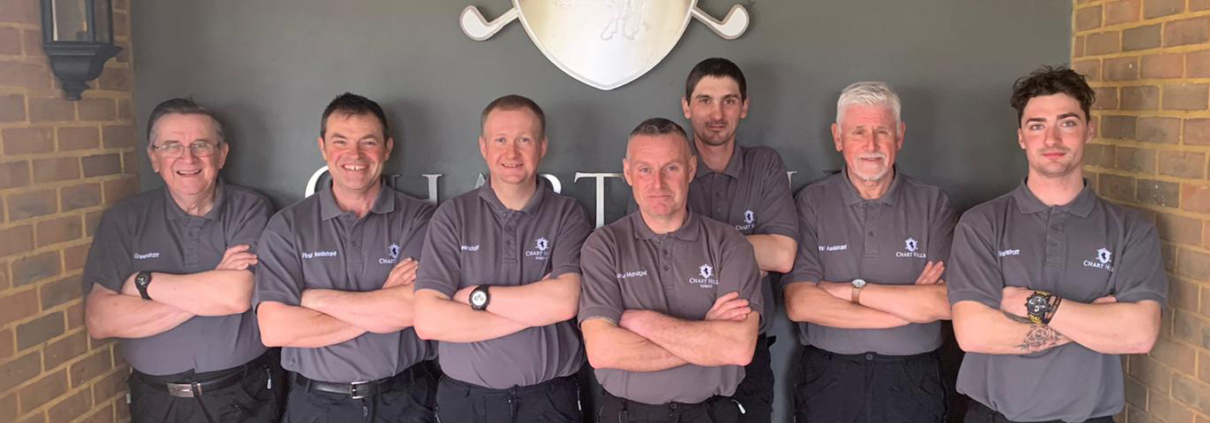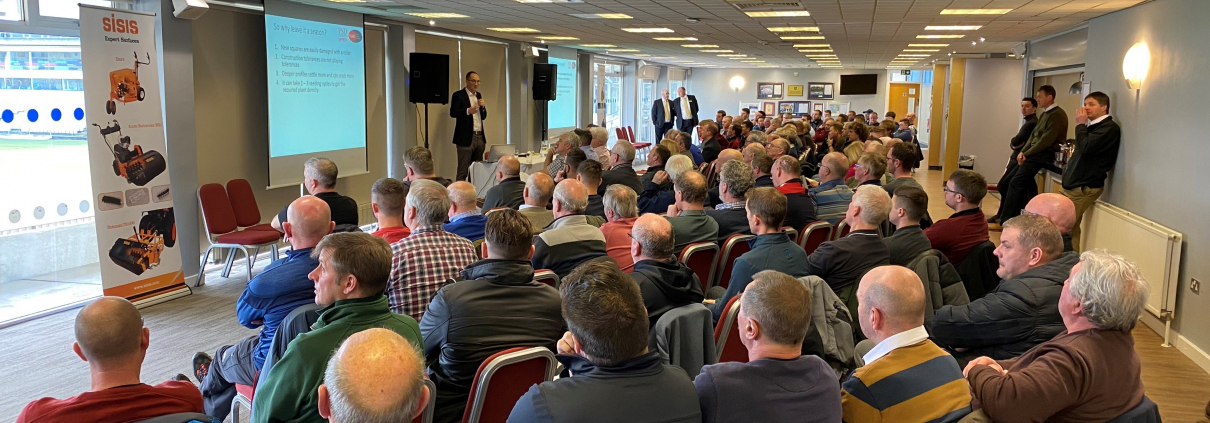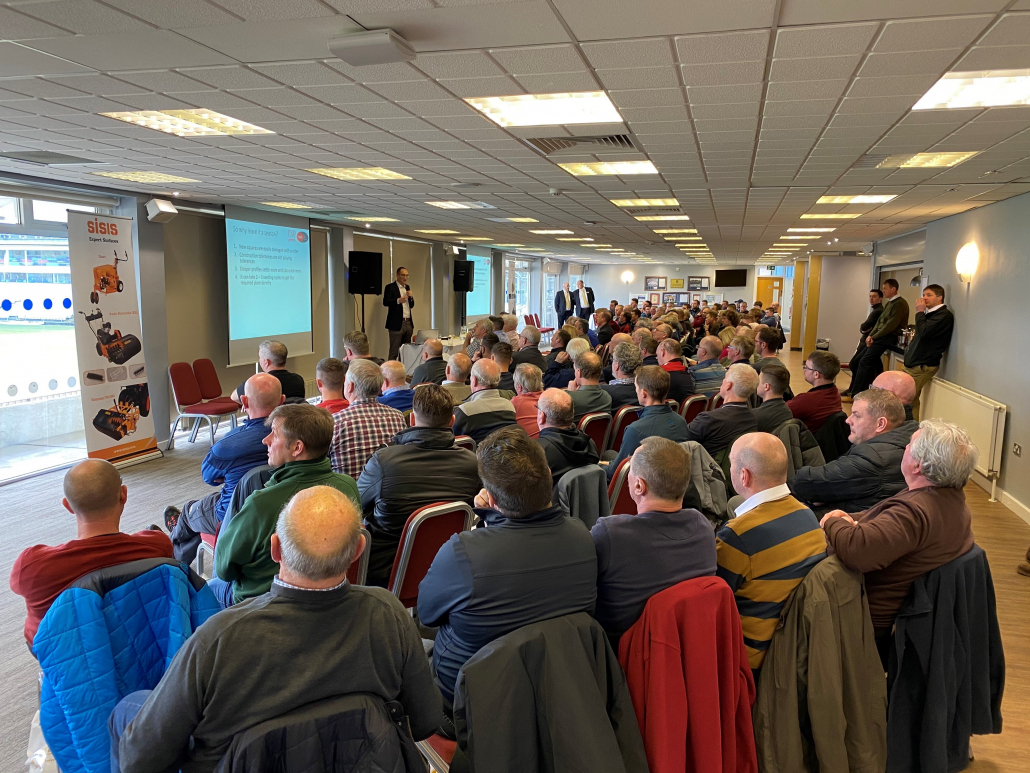The Grass is Greener in LaLiga: From the rain of the north to the heat of the south, club greenkeepers in Spain are keeping their pitches in the same high conditions. Using LaLiga’s ‘Greenkeeper’ app, clubs are not only using the best techniques but sharing their data with other clubs.
In Spain, weather conditions can vary dramatically on a single match day, from torrential rain in northern territories to blazing heat in the south, to the tropical extremes of the Balearic or Canary Islands. These factors are beyond control but across LaLiga, the club’s greenkeepers have ensured that a football match will never be affected by adverse conditions.

Using a variety of maintenance techniques, while collaborating with the league’s very own greenkeeper, clubs have created world-class playing surfaces that can withstand all weathers and maintain a consistent visual style. This has become an essential part of Spanish football, both for protecting players from injury and for creating the best possible broadcast product.
LaLiga’s Regulation for Television Broadcasting ensures that every LaLiga match follows the same visual style. It covers camera positioning and graphics used by operators, but a unique element is the state of the grass. Among other requirements, clubs must ensure that the ball rolls perfectly, that the height of the grass cut is between 20 and 30 millimetres across its surface and that the pitch maintains the same shade of green.
Given Spain’s geography, the work required to meet these standards varies greatly. But no matter the club, the results are of the same quality.
“The need to maintain the pitch has changed a lot; in our case we have had to find more protective systems for the summer sun,” noted Vicente Alpuente, director of facilities and maintenance at Villarreal CF. “We are using new varieties of grass and have created new maintenance systems to make this possible.”
A similar level of effort can be seen up and down the country.
The north: Artificial light and unique pitch drainage
The temperate climate of Bilbao and the design of the San Mamés stadium make greenkeeping a distinct challenge for Athletic Club. “As sunlight is reduced in our stadium, it must be created artificially,” says Ángel Muñoyerro, head of the club’s pitch. As half of the playing field does not receive natural light, the club has installed solar lights that help the growth and maintenance of the lawn.
A further particularity of the San Mamés pitch is that it is made from hybrid grass, a popular plant for semi-closed stadiums that provides greater stability underfoot to reduce injuries to players. “A hybrid surface is essential for maintaining the same quality across the pitch and dealing with changing conditions,” added Muñoyerro.
The winters are particularly cold in northern Spain, nowhere more so than Pamplona. Therefore, thermal blankets are needed to help stimulate the grass in Osasuna’s El Sadar stadium. The renovations that are being carried out on the stadium have also restricted the entry of natural light in certain parts of the playing field, leading to the club installing artificial lights.
Another significant challenge in this region is rain, which can be consistent for many months of the year. To combat this, clubs have designed an intricate drainage system to ensure the pitch maintains acceptable levels. In the layer just below the pitch, there are around 30 centimetres of porous sand, allowing water to pass through. Beneath that is around 15 centimetres of gravel, through which the water passes and is funnelled into tubes that push the water away from the pitch.
“The current systems is nothing like it used to be,” said Osasuna’s grounds manager Juan Carlos Sanz. “Before, you’d finish working on one side of the pitch and the previous side you’d worked on would be a quagmire. Now, football can be quicker and more technical because the pitches don’t interfere with the play.”
Central Spain: Adding nutrients for harsh winters
As the highest capital city in Europe, Madrid has its own set of climate challenges including low winter temperatures, which are felt by the seven LaLiga clubs playing in the area.
Eduard Rovira, greenkeeper at Getafe CF’s Coliseum Alfonso Pérez, comments: “In winter it is difficult to maintain the pitch, because the soil temperature drops below 6 degrees. With the altitude of Madrid, the grass becomes dormant, meaning it doesn´t easily regain nutrients after being used.” It is there necessary to change plants before the cold arrives, growing a more durable grass that can survive the frost that settles over Madrid.
Just 5 kilometres from Getafe is the Butarque stadium of CD Leganés. Here, the control over the grass is exhaustive with the club taking daily measurements of soil moisture. The application of natural products, including algae, is also used to increase the natural d efences of the grass.
To maintain the colour, the club has had to find creative solutions, which include the application of nitrogen or iron. “In winter, maintaining a good colour is particularly difficult because the plant stops growing,” said Víctor Marín, communications manager at the club. “In this period add thermal blankets along with these nutrients as it reinforces the cells of the plant.”
The south: Summer heat demands fertigation and mowing
In Sevilla FC’s Ramón Sánchez-Pizjuán stadium, a more common problem is high temperatures. Carlos Benegas, greenkeeper at the club, noted: “Our work involves decreasing the density of grass to avoid the growth of fungi and increase oxygen flow. This improves the absorption of water and nutrients that the plant needs to survive here.”
An important phase begins in March, when temperatures increase and the grass begins to grow quickly. “We end up mowing the pitch more than once a week,” Benegas noted. Using a vertical cutting blade, the pitch is kept flat, enabling better grip for the players and ensuring a smoother roll of the ball.
At Granada CF, the introduction of the LaLiga’s guidelines has transformed the level of care applied at the Nuevo Los Cármenes stadium. “Maintenance has changed hugely in terms of investment, protection systems and tools used,” noted Javier Rodríguez, director of operations and infrastructure at the Andalusian club.
The club has employed a method of fertigation, recommended by LaLiga, which involves the injection of nutrients to help efficient and regular growth. “Because of the climate here, we use a hybrid of ryegrass and bluegrass which can deal with extreme temperatures,” said Javier Rodrígez, director of operations and infrastructure at the Andalusian club. “In the hottest months, we minimise impact by good mowing and watering, but we keep this at regular intervals so as not to not stress the grass too much.”
The islands: Varying nutrients to manage desert winds
Over 1,300km from the Spanish mainland, the conditions on the Canary Islands are entirely different from the rest of the country but the same requirements are still being met.
“In summer, we apply a product to the pitch that allows us to lower the temperature of the grass on the ground,” said Santiago Sosa, greenkeeper at LaLiga SmartBank side Las Palmas. “But when the months of September and October arrive, due to the influence we have of the Sahara, there is a dust that settles here.”
“We have to manage the impact of this to maintain grass quality, which involves a lot of mechanical labour” he continued. “We use a range of products and vary the percentages of nutrients we apply, depending on the temperature, to maintain the intensity of colour.”
Greenkeeper, the LaLiga app that helps improve lawn quality
Through the varied and difficult task of maintaining their pitches, LaLiga clubs have one advantage in common. Through the Greenkeeper application, developed by the league, staff can track and input all relevant information about the pitch, from local weather conditions to irrigation programmes being used.
Through generating digital reports and sharing them before a match, clubs can prepare adequately for any stadium visit.
“Greenkeeper helps me see what conditions the team will play when we travel around the country,” said Sosa. “There is also a database showing the conditions that other teams are playing in. We know about the hardness of the pitch, the height of the grass, or if there has been a recent planting. All of this means we are ready to play the best match possible.”
Overseeing all of this is Pedro Fernández-Bolaños, grounds quality manager at LaLiga, who has the unique job of managing 42 pitches at once. Working alongside all LaLiga clubs, Fernández-Bolaños is the point of contact that can advise on new techniques for maintaining the pitch or capturing relevant data, improving conditions for the league.
“With the reforms we have introduced, three key objectives have been met,” he says. “The first is to improve the safety of the players. In the last five years, the number of non-contact injuries has gone down significantly. Secondly, the quality of play has improved as the ball moves much better, even if it’s raining. Thirdly, the stadiums look better aesthetically, which is all important for our match broadcasts around the world.”
For Rodríguez, this collaboration with LaLiga puts Spanish clubs at an advantage. “The techniques we are using are industry-leading and the ability to share this data means we can always make the best decisions,” he added. “It’s a unique feature of LaLiga.”
Click here to read the original article
For the latest industry news visit turfmatters.co.uk/news
Get all of the big headlines, pictures, opinions and videos on stories that matter to you.
Follow us on Twitter and Instagram for fun, fresh and engaging content.
You can also find us on Facebook for more of your must-see news, features, videos and pictures from Turf Matters.



















